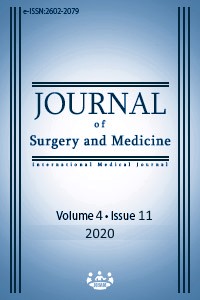The effects and reliability of the hydroxychloroquine-azithromycin combination on the cardiac conduction system in patients with coronavirus disease 2019
Keywords:
COVID 2019, long QT, ArrhythmiaAbstract
Aim: The COVID-19 virus influenced the world since late 2019 and affected millions of people. Although there is no unambiguous evidence in the treatment of COVID-19, the combination of hydroxychloroquine and azithromycin entered the protocols globally to reduce virus replication and take advantage of its immunomodulatory effects. It has been stated that both drugs extend QTc. However, the frequency of QTc prolongation in combinational drug use, and its effect on the primary endpoint, as well as the predictive values of QTc prolongation are not clear. Methods: A total of 135 patients who received hydroxychloroquine, azithromycin, and oseltamivir for suspected / definitive COVID-19 with viral pneumonia were examined in this single-center, retrospective study, Results: The mean age was 55.6 (19.1) years, and 61 (45%) patients were female. According to the initial ECG values, the QTc1 value was 422.44 (35.72) ms, while the QTc2 value was 446.91 (36.71) ms (P<0.001). The ECG evaluation after medication use indicated that the number of patients with a QTc value >500 ms was 6 (4.4%). The number of patients with prolongation in QTc values >60 ms was 7 (5.1%). The frequency of prolongation in QTc was 26% in intensive care unit patients, and 2% in low-risk patients in the inpatient unit. An elevation in troponin values >14 ng/L and a low GFR are predictors for QTc prolongation. None of these patients developed malignant arrhythmia or sudden cardiac death. Conclusion: Hydroxychloroquine and azithromycin combinations used in COVID-19 patients cause a prolongation in the QTc. The incidence of prolongation in QTc varies according to the comorbid characteristics and clinical status of the patients. Before starting hydroxychloroquine and azithromycin, the risk factors and clinical status of the patients should be well evaluated.
Downloads
References
WHO-Director-General’s opening remarks at the media briefing on COVID-19-11 March 2020.[https://www.who.int/dg/speeches/detail/who-director-general-s-opening –remarks –at-the-media-briefing-on-covid-19-11-march-2020]
World Health Organization. [https://www.who.int/emergencies/diseases/novel-coronavirus-2019/situation-reports]
Republic of Turkey Ministery of Health Official Website . [https://covid19bilgi.saglik.gov.tr/tr]
Wang M, Cao R, Zhang L, Yang X, Liu J, Xu M, et al. Remdesivir and chloroquine effectively inhibit the recently emerged novel coronavirus (2019- nCoV) in vitro. Cell Res 2020 Feb 4 [Epub ahead of print]. doi: 10.1038/s41422-020-0282-0.
Savarino A, Boelaert JR, Cassone A, Majori G, Cauda R. Effects of chloroquine on viral infections: an old drug against today's diseases. The Lancet infectious diseases. 2003;3(11):722-7. doi: 10.1016/S1473-3099(03)00806-5
Vincent MJ, Bergeron E, Benjannet S, Bobbie R Erickson, Pierre E Rollin, Thomas G Ksiazek, et al. Chloroquine is a potent inhibitor of SARS coronavirus infection and spread. Virology Journal. 2005;2(1):1-10. doi: 10.1186/1743-422X-2-69
Chen C-Y, Wang F-L, Lin C-C. Chronic Hydroxychloroquine Use Associated with QT Prolongation and Refractory Ventricular Arrhythmia. Clinical Toxicology. 2006;44(2): doi: 10.1080/15563650500514558
Chugh SS, Reinier K, Singh T, Uy-Evanado A, Socoteanu C, Peters D, et al. Clinical perspectıve. Circulation. 2009;119(5):663-70. doi: 10.1161/CIRCULATIONAHA.108.797035
.Gautret P, Lagier JC, Parola P, Hoang VT, Medded L, Morgan Maılhe et al. Hydroxycloroquine and azithromycin as a treatment of COVID-19:preliminary results of an open-label non-randomized clinical trial. medRxiv 2020.03.16.20037135. doi:. 10.1101/2020.03.16.20037135
Choi Y, LimH-S, Chung D. Choi J, Yoon D. Risk evaluation of azithromycin-induced QT prolongtion in real world practise. BioMed Research İnternational. 2018;ID1574806. doi: 10.1155/2018/1574806
Republic of Turkey Ministery of Health COVID-19(SarS –CoV-2 ) guide 25.03.2020 https://www.tahud.org.tr/file/4f42cbfd-bbd9-4bf4-91b0-29698f53f198/COVID-19_Rehberi.pdf
Tisdale JE, Jaynes HA, Kingery JR, Mourad NA, Trujillo TN, Overholser BR, et al. Development and validation of a risk score to predict Qt interval prolongtion in hospitalized patients.Circ Cardiovasc Qual Outcomes. 2013;6(4):479-87. doi: 10.116/cırcoutcomes.113.000152
Dutkowski R, Smithb JR, Davies BE. Safety and pharmacokinetics of oseltamivir at standard and high dosages. International Journal of Antimicrobial Agents. 2010;35:461–7. doi: 10.1016/j.ijantimicag.2009.12.023
Downloads
- 516 873
Published
Issue
Section
How to Cite
License
Copyright (c) 2020 Berat Uğuz, İsmet Zengin, Dursun Topal, Selvi Coşar, Selma Tiryakioğlu, Mustafa Adem Yılmaztepe
This work is licensed under a Creative Commons Attribution-NonCommercial-NoDerivatives 4.0 International License.
















